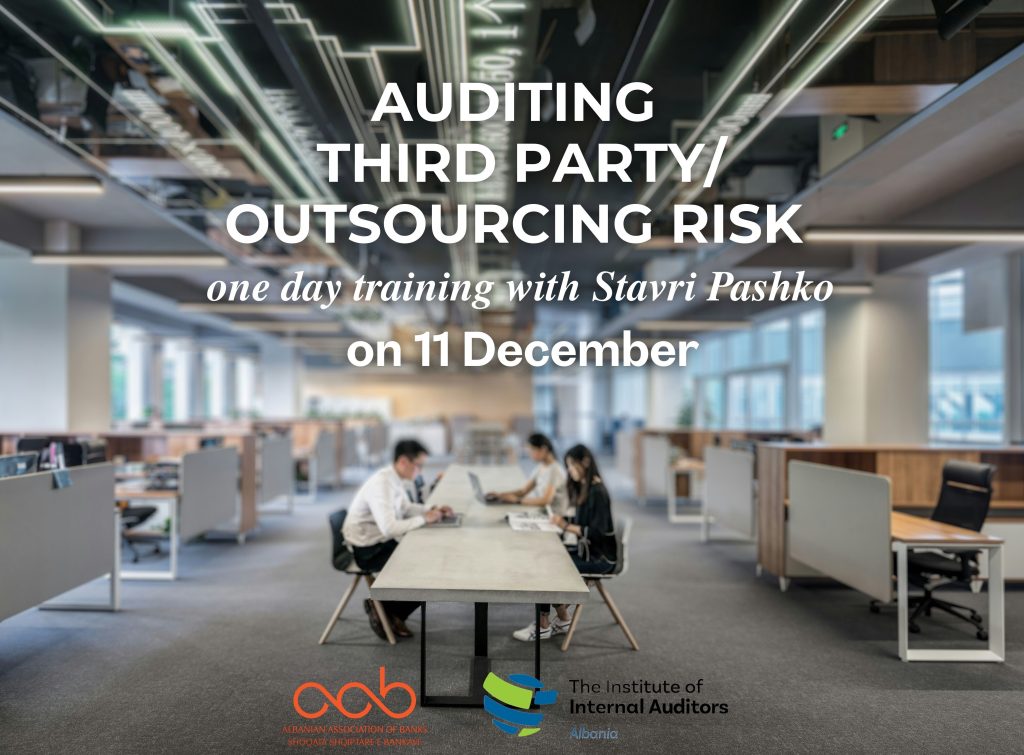
General Information
Date: 11 December 2024 (one day training)
Time: 09:00 – 17:00
Location – To be decided soon
Course director: Stavri PASHKO
Introduction
This course is designed to equip auditors with the expertise to serve as trusted advisors, elevating procurement performance while effectively managing fraud risk. Participants will gain the skills to evaluate and optimize procurement operating models, using strategic auditing techniques to drive efficiency and effectiveness. Combining theoretical foundations with practical applications and real-world case studies, the course offers an engaging, hands-on experience that delivers actionable insights.
Course objective
By the end of this course, participants will be able to:
- Discuss the strategic imperatives of sourcing and procurement.
- Identify potential benefits and challenges associated with emerging sourcing, procurement, and supplier management trends.
- Evaluate the efficiency and effectiveness of an organization’s sourcing and procurement strategies, structure, and people.
- Assess the quality and performance of suppliers and suggest improvements.
Target audience
The target audience for this course includes, but is not limited to internal auditors with a knowledge level from beginner to intermediate.
Course Program
Introduction to Strategic Sourcing and Procurement
- Overview of procurement and supply management strategies.
- Differences between direct and indirect procurement.
- The role of internal auditors in enhancing procurement processes.
Theoretical Framework: Key Concepts
- Procurement Strategies and Objectives: Cost-saving initiatives, vendor performance management, and strategic sourcing.
- Internal Controls in Procurement: Segregation of duties, approval hierarchies, and conflict-of-interest management.
- Fraud Risk in Procurement: Procurement fraud schemes, with real-world examples for context.
Audit Planning and Execution
- Risk Assessment: How to evaluate procurement processes for inherent and residual risks
- Objectives and outcomes of sourcing and procurement audits.
- Steps to plan and execute an effective procurement audit.
- Evaluating organizational structure and the role of people in procurement.
- Tools and metrics to evaluate whether procurement objectives are met efficiently.
- Responding to trends: sustainability, ethical sourcing, and supply chain transparency.
Fraud Risk and Detection in Procurement
- Red Flags: Common warning signs in procurement activities, like repeated use of the same vendors or unusually high prices.
- Interview Techniques: How to question procurement staff to uncover irregularities without causing defensiveness.
- Document Review: What to look for in contracts, purchase orders, and vendor agreements.
Mitigating Risks and Improving Procurement Processes
- Best Practices: Discuss continuous monitoring, procurement policy updates, and potential technology solutions.
- Collaborative Approaches: Emphasize the importance of working with procurement and compliance teams.
Course Wrap-Up
- Summary: Review key takeaways and discuss next steps for applying the knowledge gained.
- Q&A: Open session for participants to ask questions and share feedback.
- Evaluation: Participants complete a course evaluation to provide feedback.
Instructor Bio
Stavri Pashko is a seasoned professional with close to two decades of experience in internal auditing, business consulting, project management, and sustainability. He has started his professional career in the Albanian banking sector as an internal auditor two prominent banks in the Albanian banking sector.
During that time, Stavri co- founded and lead the Albanian Institute of Internal Auditors, from an idea into making it a recognized chapter of Global Institute of Internal Auditors. During that time, he has actively organized and led events aimed at enhancing the professional development of auditors, as well as actively advocating for the profession of internal auditing in Albania and Kosovo.
Stavri’ s international experience extends to engagements with public listed companies in the telecommunications and automotive industries, such as Telia Company, Volvo Group and Volvo Cars, where he has fulfilled roles related to internal audit, risk management, and sustainability. In addition, Stavri has contributed to the Global Institute of Internal Auditors, serving as a member of the Guidance Development Committee and the Membership Committee for IIA Sweden.
He is an alumnus of the University of Turin, Italy, and holds a master’s degree from the University of Malmö in Sweden. Stavri is a Certified Internal Auditor (CIA) and possesses additional qualifications in risk management and sustainability. He is also a certified trainer authorized to deliver IIA-prepared training programs.
Currently, Stavri is working with sustainability compliance in the supply chain, and he holds the position of Board Member and Chairman of the Audit Committee for one of the largest banks in Albania. www.linkedin.com/in/stavripashko With over 15 years of experience in internal audit within banks, Maciej currently serves as the Chief Audit Executive of Polish Development Bank, overseeing a team of twenty-six auditors. He holds the CIA designation and is a Vice-Chairman of IIA Poland, actively contributing to international cooperation.
Important Financial Data
Cost per participant: AIIA Members 180 € (total amount, the subject is VAT excluded)
Non-members 210 € (total amount, the subject is VAT excluded)
Price includes course attendance and educational material.
Payment* can be made by bank transfer or direct deposit by using the following account info: Account Holder: Albanian Institute of Internal Auditors Acc.no: 0010039700
Swift: SGSBALTX IBAN: AL43 2021 1123 0000 0000 1003 9700
Raiffeisen Bank Albania
Contact us for quotes related to more than two participants from the same organization or other information: [email protected]
* Important: The transferred amount must include the entire amount as stated above. No shortfalls due to exchange fee/or other administration charges may arise. Albanian Institute of Internal Auditors has to receive the amount that is stated in your invoice.






